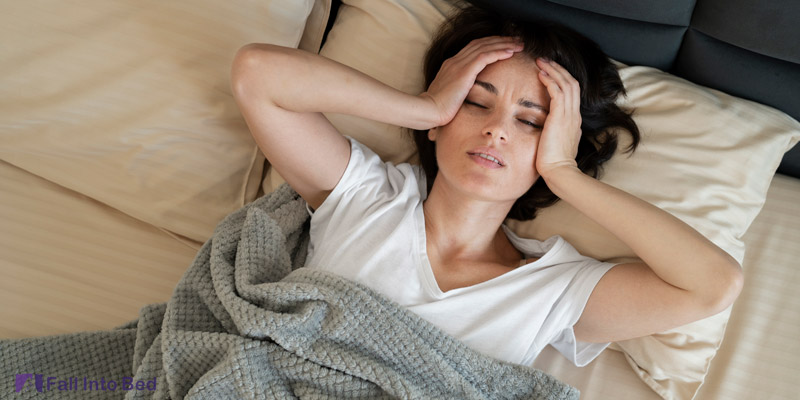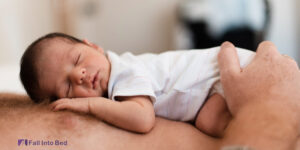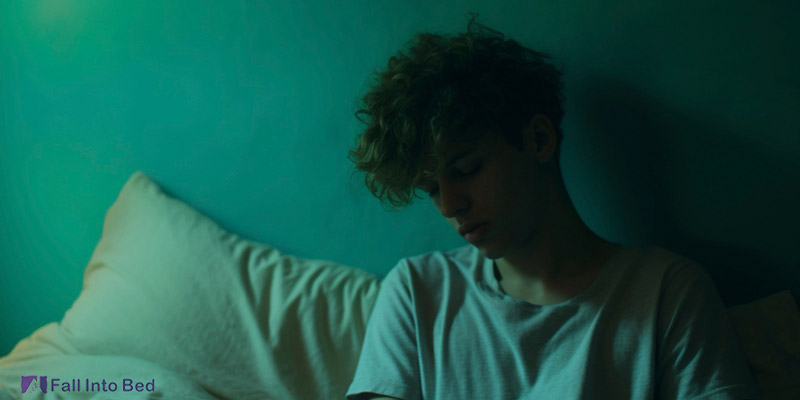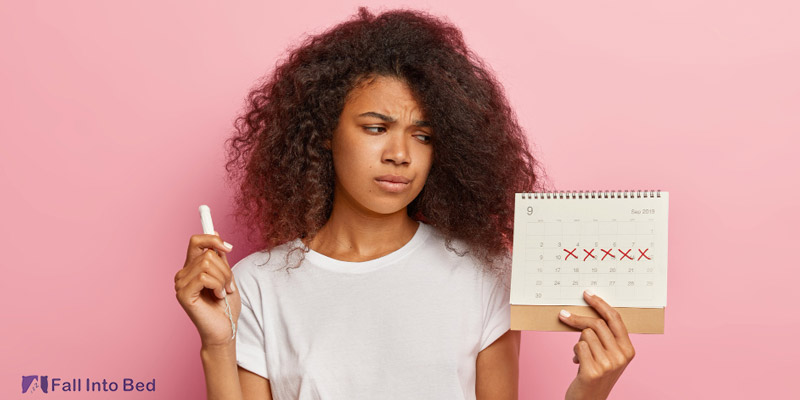It is always useful to take a short nap during the day to recharge and regain our focus and energy. But the story gets complicated when you wake up from your “power” nap with a headache and feeling more tired than before. And let me tell ya, headaches are NOT fun!
The headaches caused by naps are very common but not healthy. But the good news is that you can prevent them by making a few changes in your sleep habits. In this article we’ll go over the reasons why this happens and what can you do to avoid or cure it.
Why do naps give me headaches?
1. Sleep apnea
People with sleep apnea are likely to experience headaches after sleeping, due to the interrupted breathing throughout their nap or sleep. The low oxygen in blood due to the interrupted breathing can cause headaches. Usually after the apnea is treated, the headache will go away.
To alleviate symptoms of sleep apnea during sleep, try sleeping in a position that reduces breathing problems.
2. Snoring
Snoring can also make your blood short on oxygen and result in headache after you wake up. If the pillow or your sleep position is causing the snoring, you can try a different position to alleviate this breathing problem and get a suitable pillow. Another reason can be nasal obstruction.
3. Dehydration
Not drinking enough water is one of the most common reasons for headaches. Napping can cause dehydration because of two reasons.
1. You obviously don’t drink for the duration of your nap
2. Excessive sweating can cause dehydration.
So, always make sure you drink enough water before taking a nap. And pick an environment with low temperature to ensure there will be no sweating.
4. Too much caffeine
Most of us start our days with a cup of coffee, and then another one at noon, then another one, and another one! Too much caffeine can cause dehydration and lead to headaches. Also, the effects of caffeine can leave you with interrupted sleep which can, again, lead to headache after waking up.
Keep in mind that the recommended amount of caffeine to take each day is 400mg or 3 cups of coffee. Make sure you don’t drink more than that and take water multiple times a day.
5. Caffeine withdrawal
If you’re a regular caffeine consumer and you didn’t take your normal dose of caffeine you can experience something called caffeine withdrawal. The symptoms can be headache, difficulty focusing and muscle pain.
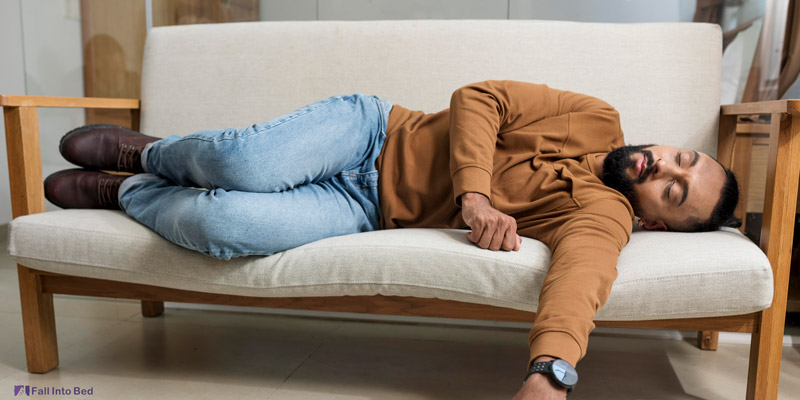
6. Using the wrong pillow
Sleeping with a too small or too large pillow, can increase tension in your back and neck muscles. These tensions will result in experiencing pain in neck and head. By using a pillow with the right size, and being mindful about your sleep position, you can avoid a headache after a nap.
7. Teeth grinding
One of the reasons for headaches after naps, can be something called teeth grinding or bruxism. This unintentional action can result in tension in your jaw and face muscles and lead to headache and pain in your teeth.
To reduce the headaches caused by clenching your jaw, you can try meditation before sleep. There are other actions you can take as well, like using a mouth guard. Also, paying attention to your lifestyle and avoid stress, alcohol and excessive caffeine consumption can help with the symptoms.
8. Sudden stress
Sometimes we suddenly wake up from a nap due to loud noise or bad dreams or the stress of oversleeping. These things can also lead to headache. If you’re a heavy sleeper or you want to wake up a heavy sleeper from a nap, try to set an alarm that gradually get louder, instead of a sudden noise next to you.
9. Having too short or too long naps
If you take a too short or too long nap, you will probably wake up even more tired than before and with a bonus headache. So, always pay attention to the sleep cycle and calculate your nap time and when you should wake up.
Sometimes, due to having too much things to do, you don’t have enough time to sleep for long. In these situations, sometimes it’s better to sleep for two hours rather than skip sleep altogether. However, there are things you need to consider when doing this.
How long should a nap be to avoid headaches?
When it comes to the perfect length for a nap, it’s important to know the sleep cycle and the time of each sleep stage. Experts claim that having too long or too short naps can leave you in the wrong stage and cause headaches upon waking up.
The best length of a nap is between 20-30 minute; this way, you wake up in stage two, where you haven’t reached a very deep sleep. If you’re up to it and have enough time, you can go for a 90-minute nap. this way you sleep through a whole cycle and wake up fresh and without any headaches.
How to get rid of headache after a nap?
1. Hydrate
Most of the times, the headaches are caused by not drinking enough fluid before your nap. Try to rehydrate yourself after waking up by drinking water.
2. Practice sleep hygiene
Sleep hygiene is about your sleep habits, sleep environment and your routines. You can apply your sleep hygiene to your naps as well. You can try to maintain a consistent nap routine, try to keep a relaxed and comfortable environment for your quick nap.
One of the most important things is to place your phone far from you, or put it on airplane mode, to reduce the radiation of the phone.
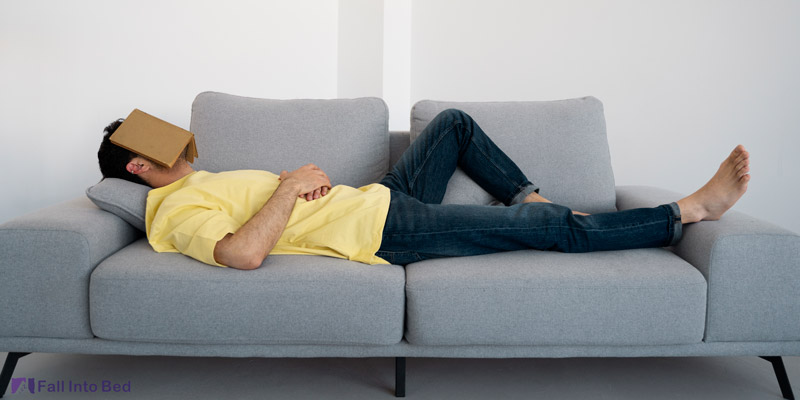
3. Limit your caffeine
As we mentioned, consuming too much caffeine or not taking your daily dose, will result to a headache after waking up. So, we recommend you to keep an eye on your caffeine consumption and the time of day you take it.
It might not be pleasant to hear, but one way is to try and reduce your caffeine intake gradually. Don’t do it suddenly as it can cause headache itself. Another way to make sure your caffeine consumption is not going to bring up headaches for you, is to be drink enough water during the day and after your caffeine intake.
4. Stretch
Something that can cause headache after napping is the tension in your neck muscles caused by an uncomfortable pillow. Stretching your neck and head after waking up can relieve some of that tension in your muscles, and help with the headache or totally prevent it.
FAQ about headache after nap
Why do I always get a headache after an afternoon nap?
Headaches after a nap is pretty common but easily preventable. The headache can have several reasons like dehydration, sleep apnea, snoring, too short or too long nap, excessive caffeine or caffein withdrawal.
Is it normal to have headache after a nap?
The headache you experience after a nap is very common and you’re not alone. The headaches usually happen to due not having good sleep hygiene and other sleep habits. and there is nothing to worry about if this is the reason.
But if the headaches stay for a long period of time or the pain is unbearable even when you pay attention to your sleep environment, make sure you consult a healthcare professional as soon as possible.

